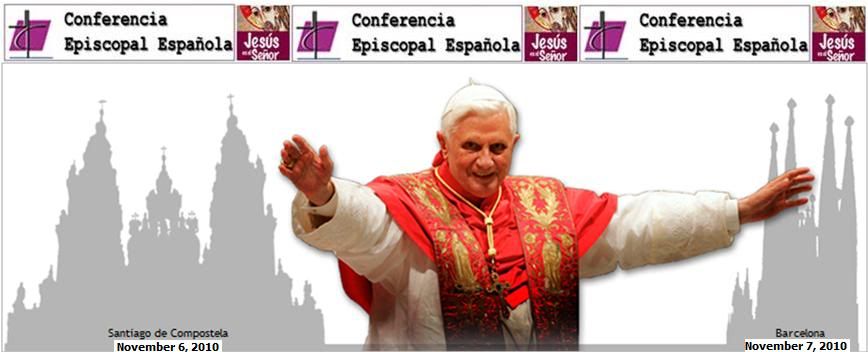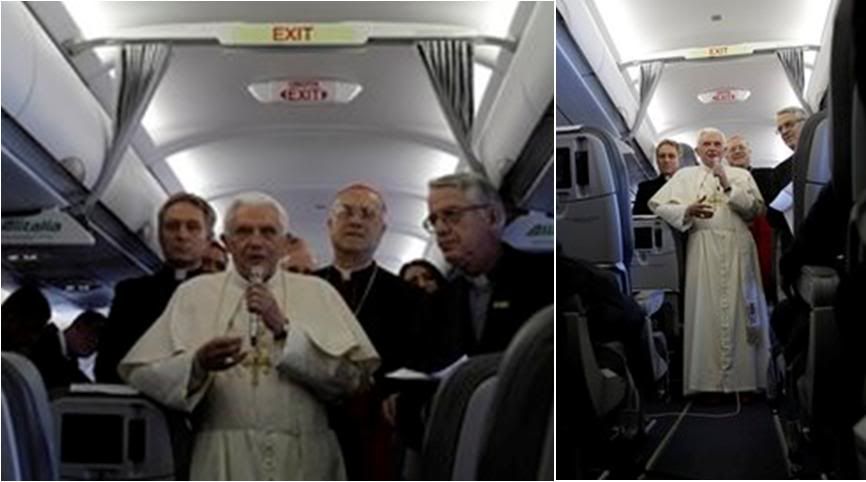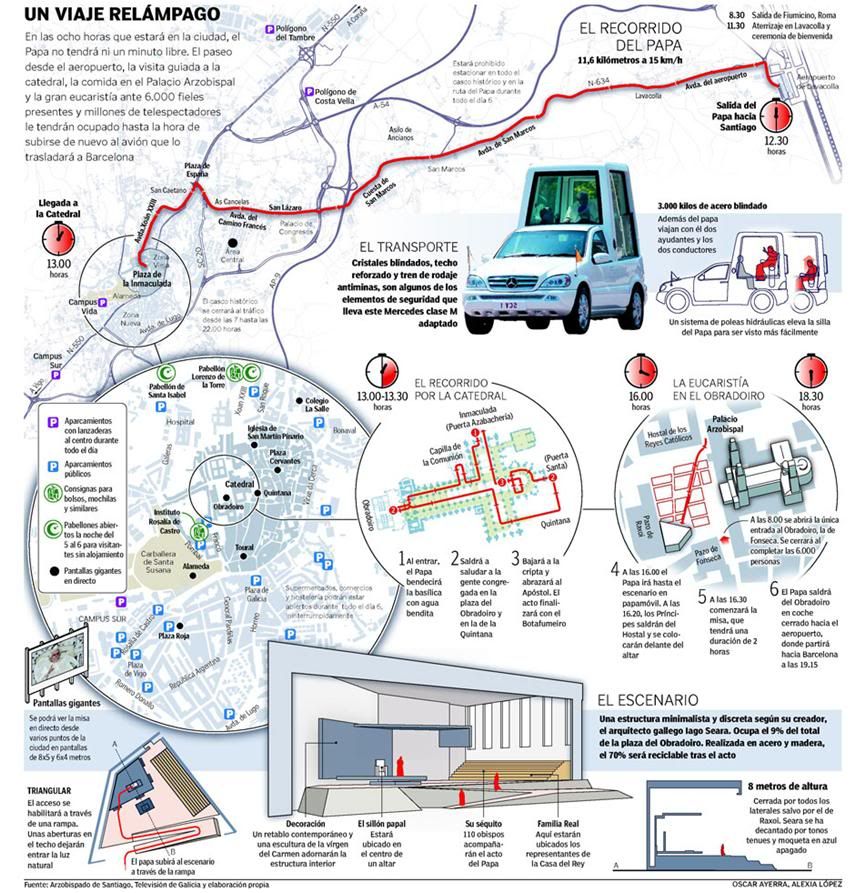| | | OFFLINE | | Post: 21.388
Post: 4.024 | Registrato il: 28/08/2005
Registrato il: 20/01/2009 | Administratore | Utente Master | |
|
 Pope blasts Spain's
Pope blasts Spain's
'aggressive' anti-Church ways
By NICOLE WINFIELD

SANTIAGO DE COMPOSTELA, Spain, Nov. 6 (AP) — Pope Benedict XVI has criticized what he calls an "aggressive" anti-Church sentiment that he says is flourishing in Spain.
The Pope arrived Saturday on a two-day visit to rekindle the faith in a key Western nation.
Benedict said the anti-clericalism being felt today in Spain harks back to the 1930s, when the church suffered a wave of violence and ill feeling as Spain lurched from an unstable democracy to civil war.

Speaking Saturday to journalists en route to Santiago di Compostela, Benedict said he had created a new Vatican office to fight such secular trends worldwide. He said Spain was a particular focus since it had played such an important role in reviving Christianity in centuries past.
Here is a translation of the Q&A from the Vatican transcript. There were 61 newsmen on the papal flight, including the Spanish correspondents accredited to the Vatican, and eight more who had come from Spain expressly for this, including teams from the regional TV of Galicia and Catalunya. Fr. Lombardi told the Pope that more than 3,000 newsmen had been accredited to cover the events in Spain.
Father Lombardi: Your Holiness, in your message for the recent international congress on shrines that took place in Santiago de Compostela itself, you said that you are living your pontificate "with the sentiments of a pilgrim". Even your coat of arms carries the pilgrim's scallop shell. Would you like to tell us something about your perspective on this pilgrimage, in your personal life as well as in your spirituality, and about your thoughts on coming to Santiago as a pilgrim?
Good morning. I can say that being on pilgrimage is already inscribed in my biography - Marktl, Titmoning, Aschau, Traunstein, Munich, Freising, Bonn, Muenster, Tuebingen, Regensburg, Munich again, Rome - but perhaps this is something external. It makes me think, however, that makes me think of the instability of this life, of being on a journey. On the other hand, one can also say against pilgrimages that God is everywhere, one does not need to go elsewhere, but it is also true that faith, by its nature, is 'to be a pilgrim'.
The Letter to the Hebrews shows what faith is in the person of Abraham, who leaves his land and remains a pilgrim all of his life toward the future. This Abrahamic movement persists in the act of faith, which is being a pilgrim above all, interiorly, but it should also express itself exteriorly.
Sometimes, to leave behind the everyday, the world of what is useful, of utilitarianism, to leave this in order to be truly on a journey towards transcendence - transcendence of oneself, transcendence of the everyday, and thus to find a new freedom, time for interior rethinking, to identify oneself, to see the other, God - is also always a pilgrimage. It's not only leaving oneself towards something greater, but it is also travelling together.
Pilgrimage reunites us - we walk together towards the other and we find ourselves reciprocally. One simply has to note that the various routes of St. James were an element in the spiritual formation of teh European continent. On pilgrimage, the European common identity was found, and even today, this movement is being reborn, this need to be in spiritual and physical movement, to find each other, and thus to find silence, freedom, renewal - and to find God.
Now, let us turn to Barcelona. What significance can there be in the dedication of a temple like the Sagrada Familia in the 21st century? Is there any specific aspect of Gaudi's vision that has struck you in particular?
Actually, this church is also a particular sign of our time/ I find in Gaudi's vision three elements first of all:
The first is this synthesis of continuity and novelty, tradition and creativity. Gaudi had the courage to enlist himself in the great tradition of cathedrals, but to dare anew, in his century, with a totally new vision of this reality: of the cathedral as the place of encounter between God and man, in great solemnity. He had the courage to stay within tradition, but with a new creativity that renews tradition, thus demonstrating the unity of history and progress in history. It is a beautiful thing.
Secondly, Gaudi was working from a trinomial: the book of Nature, the book of Scripture, and the book of liturgy. This synthesis is of great importance today. In liturgy, Scripture becomes present, it becomes reality now - it is no longer just some writing from 2000 years ago, it is celebrated, realized. And in the celebration of Scripture, Creation speaks, the creature speaks and finds his true answer, because as St. Paul says, Creation suffers, and instead of being destroyed, and despised - it awaits the children of God, those who see creation in the light of God. And so, I think that this synthesis between the sense of creation, Scripture and adoration is a message that is very important today.
Finally, the third point, this cathedral was born of a devotion typical of the 19th century to St. Joseph, the Holy Family of Nazareth, the mystery of Nazareth. But one could say that this devotion from the past is in itself of the greatest relevance, because the problem of the family, the renewal of the family as the fundamental cell of society, is a major issue these days and tells us how we can proceed in the building of society and in uniting faith adn life, religion and society. Family is the fundamental theme expressed here, telling us that God himself became a child in a family, and calls on us to build and live as family.
Gaudi and the Sagrada Familia represent effectively the binomial of faith and art. How can faith find its place in the world of art and culture today? Is this one of the themes of your Pontificate?
That is so. You know that Iinsist very much on the relation between faith and reason, that faith, the Christian faith, has an identity only in being open to reason, and that reason becomes itself when it transcends towards faith.
Equally important is the relationship between faith and art, because truth - the purpose and goal of reason - is expressed in beauty,and becomes itself in beauty, where it shows itself to be the truth. And so where truth is, beauty must be born. Where the human being realizes himself correctly, doing good, then he expresses himself in beauty.
The relationship between truth and beauty is inseparable, that is why we need beauty. In the early Church, even in the great modesty and the outright poverty of the time of the persecutions, art, painting, expressing God's salvation in images of the world, in song, and later, even in building - all this is constitutive for the Church and will always be constitutive. That is why the Church has been the mother of arts for centuries.
The great treasure of Western art - in music, in architecture, in painting - was born from faith within the Church. Today there is a certain 'dissent', but this is bad for art as well as for the faith: art which loses the root of transcendence will no longer project itself toward God - it would be a diminished art, it would lose its living root. And a faith that keeps its art only in the past would not be a faith in the present, which ought to express itself anew today as truth which is always present.
Therefore the dialog or encounter - I would say the ensemble - of art and faith is inscribed in the most profound essence of the faith. We should do all we can so that even today, faith can express itself in authentic art, like Gaudi, in continuity and in novelty, and that art does not lose its contact with faith.
The new dicastery for new evangelization has been launched in the past months. Many are asking whether Spain, with the strides it has made in secularization, and the rapid decline in religious practice, is one of the nations you were thinking about with this new dicastery, or even, whether it was the principal target.
With this new dicastery, I was thinking of the whole world because new thinking, the difficulty of thinking with the concepts of Scripture, of theology, is universal. But of course, there is a center, and this is the Western world with its secularism, its laicity, whereas the continuity of the faith requires that it should seek to renew itself to be a faith for today and to respond to the challenge of laicity.
In the West, all the major nations have their own way of dealing with this problem: we saw that, for example, in our trips to France, to the Czech Republic, and the United Kingdom, where it is evident everywhere in specific ways for each nation, with its own history, and this goes even more strongly for Spain.
Spain was always one of teh 'original' countries of the faith. We must recall that the rebirth of Catholicism in the modern era began above all thanks to Spain. Figures like St. Ignatius of Loyola, Teresa of Avila and John of the Cross truly renewed Catholicism - they formed the physiognomy of modern Catholicism.
But it is equally true that it is in Spain where anti-clericalism, a strong and aggressive secularism was born, such as that which we saw in the 1930s. This dispute - more than that, this clash - between faith and secularity therefore also has its center in Spanish culture today. In this sense, yes, I was thinking of all the major countries of the West, but Spain above all.
With your trip to Madrid next year for World Youth Day, you will have made three visits to Spain, which has not happened with any other country. Why this privilege? Is it a sign of love or of special concern?
Of course, it is a sign of love. One might say that it is by chance that I will have visited Spain three times. The first time was the great World Encounter of Families in Valencia. How could the Pope be absent when the families of the world get together? Next year is for World Youth Day, and the Pope cannot be absent from such an occasion either. Finally, this year, we have the Holy Year of St. James and the consecration, after more than a hundred years, of the church of Sagrada Familia in Barcelona - how could the Pope not come?
Therefore, in themselves, each occasion was a challenge - almost a necessity - for me to go. But the fact that so many occasions have been concentrated in Spain shows that it is truly a nation full of dynamism, full of the power of the faith, and that the faith responds to the challenges present in Spain. So we can say, it is by chance that I come to Spain, but this circumstance demonstrates a more profound reality, the power of the faith and the power of the challenges to the faith.
Now, if you would like to say anything more to conclude this meeting. Is there a special message that you hope to give to Spain and today's world with this trip?
I would say that this trip has two themes. There is the theme of pilgrimage, of being on the way, and there is the theme of beauty, of the expression of truth in beauty, of the continuity between tradition and renewal.
I think that these themes are also a message: to be on the way, and not to lose the way of faith; to seek the beauty of the faith, of the tradition of the faith which can express itself and engage with modern concepts of beauty, with the world of today. Thank you.
THE POPE'S DAY IN COMPOSTELA:
'A lightning trip'

[Modificato da TERESA BENEDETTA 09/11/2010 20:30] |